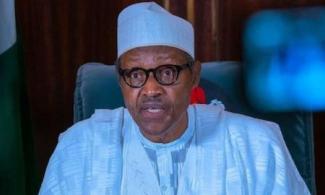
The President made the call in a message at the opening of a strategic meeting of spokespersons for various security agencies in the country, on Wednesday in Abuja.
President Muhammadu Buhari has called for a robust collaboration between heads of security agencies, their spokespersons and the media in order to carry Nigerians along in the fight against insecurity.
The President made the call in a message at the opening of a strategic meeting of spokespersons for various security agencies in the country, on Wednesday in Abuja.
The event, which has Public Relations Officers of several security and law enforcement agencies in attendance, is to strategise on reporting security issues during the 2023 elections, the News Agency of Nigeria reports.
Buhari, who was represented by his Special Adviser on Media and Publicity, Mr Femi Adesina, said it is important for heads of security agencies to be open to their spokespersons and the media at all times.
“Give them a sense of belonging to do their job to the best of their ability, remembering Public Relations Officers only when in trouble is not the right way to go,” he added.
The President said communication doors must open “so that it is not only when you run into trouble that you remember them”.
“If there is a need to accept wrongs, quickly accept it; don’t try to cover infractions; apologise to the public, this will help get the confidence of the public,” he added.
Earlier, Dr Ahmed Audi, Commandant General (CG), Nigeria Security and Civil Defence Corps (NSCDC), said the strategic meeting was held to address critical issues and explore challenges ahead of the 2023 elections.
“Sensitivity is part of security architecture; this conference will further deepen knowledge in the handling of sensitive security information.
“The public has the right to know, however, their knowing has to be strategic as well, for improved operational efficiency going forward,” he said.
Audi explained that security agencies also rely on credible information from citizens to ensure the timely prevention of crimes and in managing conflicts.
“Every member of the society has a level of responsibility in ensuring security.
“Some need to volunteer information, some to provide counselling and some to engage in the theatre of the war itself,” he said.
He however said that existing strategic communication channels must be improved upon and sustained to allow the public to have confidence in security operatives.
“It is by so doing that the public will have more trust and confidence in working together with us,” he added.
Audi enjoined all Nigerians to work closely with security agencies, and stop discrediting the efforts of the Nigerian Government to address the country’s security challenges.
He also urged politicians not to politicise the security situation in the country as the federal and state governments step up strategies in the fight against terrorism and other crimes.
In his remarks, Mr Mukhtar Sirajo, President of the Nigeria Institute of Public Relations (NIPR), said the training came at a critical time when security challenges need to be confronted by everyone.
He said that strategic communication is at the core of public relations, adding that communication is a peculiar field that can only be managed by trained persons.
The NIPR president, therefore, appealed to the spokespersons to join the institute in line with the law guiding professional PR practice in the country.
The event, organised by the NSCDC, had in attendance state NSCDC Commandants, their spokespersons and other media stakeholders.
Others include PROs of the Federal Road Safety Commission, Department of State Services, Nigeria Correctional Service, Federal Fire Service, Nigeria Customs Service, Independent Corrupt Practices and Other Related Offences.
Most heads and spokespersons for Nigerian security agencies are hostile to journalists and reluctant to answer questions relating to their agencies and personnel, especially concerning human rights violations.